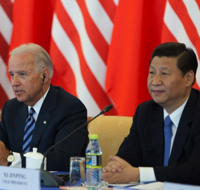According to an unnamed administration official cited by the Atlantic’s Steve Clemons this week, Vice President Joe Biden has been tasked by the White House with overseeing U.S.-China relations. As such, Biden will work directly with his Chinese counterpart, Vice President Xi Jinping, who is currently responsible for the Chinese side of the strategic dialogue between Beijing and Washington, but is widely expected to succeed to the Chinese presidency later this year. As Clemons concluded, the move reflects the Obama administration’s assessment that the “management of U.S.-China policy has become so central to a vast array of other policy challenges that the administration's approach needs to be both broad and managed with ‘a deep and senior bench.’”
Biden’s expected appointment would supersede the earlier double-headed structure of the U.S.-China Strategic-Economic Dialogue, co-chaired on the U.S. side by Secretary of State Hillary Clinton and Secretary of the Treasury Timothy Geithner, which many observers felt was not producing a unified, coherent position on China. After all, the need for the U.S. to find workable solutions with Beijing on economic and financial issues was running up against increased divergence between U.S. and Chinese positions on human rights, Asian regional security and even on global issues such as humanitarian intervention in the Middle East. Geithner and Clinton often faced opposite and even contradictory imperatives in handling their respective portions of the relationship.
So centralizing the dialogue under the auspices of the two No. 2 men may help to harmonize matters. Indeed, establishing a Biden-Xi bilateral commission to oversee all aspects of the U.S.-China relationship was precisely what Leon Fuerth (.pdf), the former national security adviser to Vice President Al Gore, had advised. Fuerth argued that binational commissions co-headed by the U.S. vice president and a foreign official of equal rank, similar to one overseen by Gore and then-Russian Prime Minister Victor Chernomyrdin in the 1990s, add “an ad hoc, highly flexible and informal system both within and between the cooperating governments” to keep key bilateral relationships on track.

